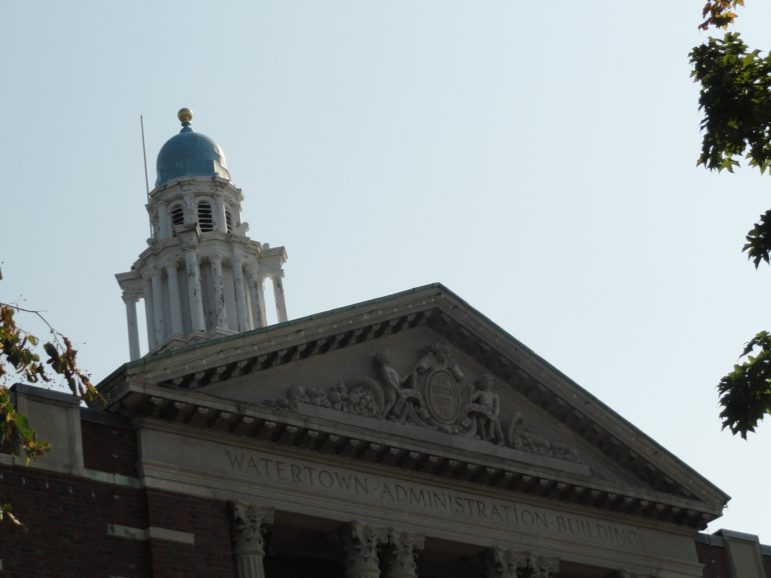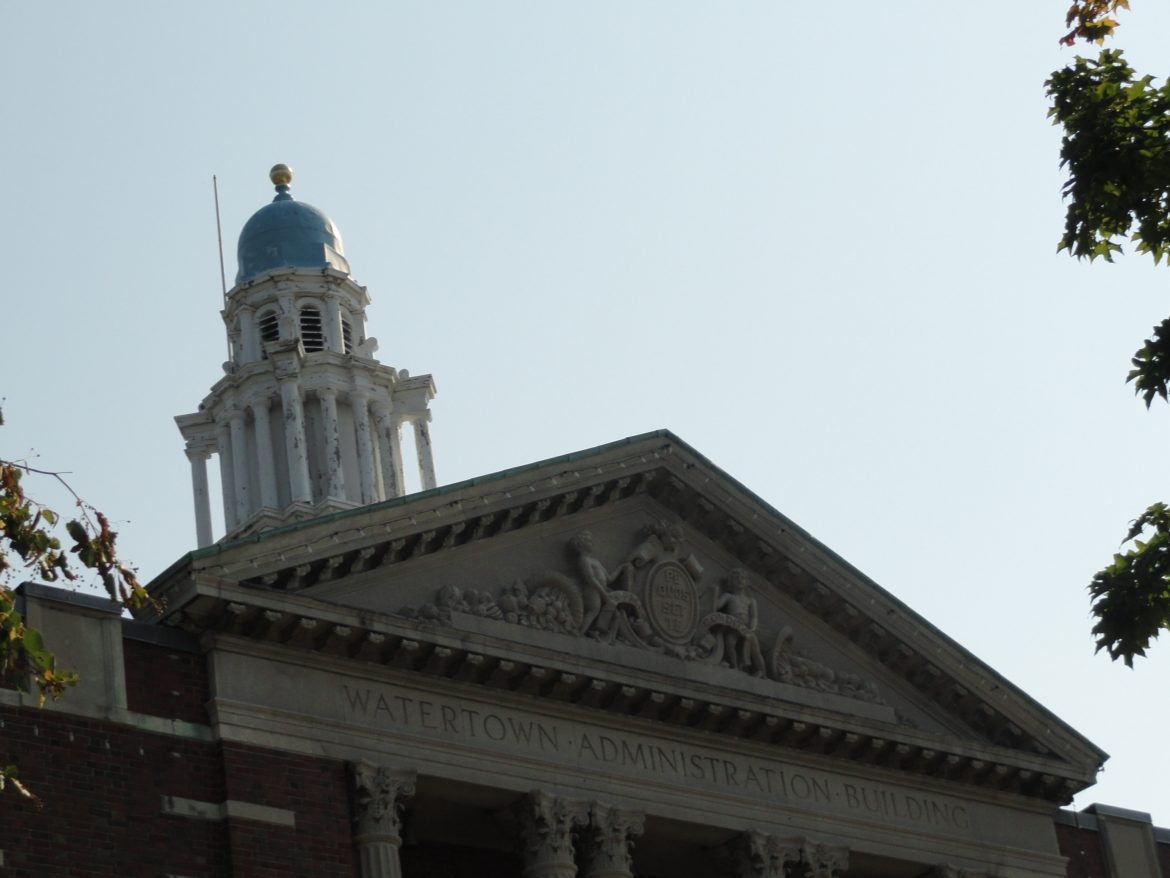
As the Watertown Charter Review Committee tried to narrow in on what they want to improve by changing the Town’s Charter, members debated what was the most important task for the municipal government, and whether one form of government — strong town manager or mayor — would be better suited to accomplish those things.
Resident member Marcia Ciro kicked off the conversation at Tuesday’s meeting with an example of the frustration she has had trying to get the Town government to respond to her requests for information and assistance. When the group first started meeting in October she requested an organizational chart of Watertown’s government and she finally got one this week, but it was one that was a few years old.
“When I look at our government now, it is not very accountable, not very transparent, very opaque, very hard to know what’s going on,” Ciro said. “I was asking myself this week, if we had a mayor would I have to wait three months for an org chart. I got that today and it is the old one.”
She added that since the Charter Review Committee has all nine members of the Council, along with six appointed members, major changes are not likely to happen.
Town Council President Mark Sideris said the committee will be provided an updated one when it is provided by the Personnel Department.
Council Vice President Vincent Piccirlli argued that Watertown’s current form of government, an elected Town Council as the legislative branch and an appointed Town Manager as the executive branch, has served the Town well and is the most responsive to residents.
“What would we get from going to a mayor and what would we give up?” Piccirilli said. “In a city with a mayor, the mayor creates the budget by herself or himself, without input from the legislative branch. Look at Boston and look at Waltham, the mayors basically ignore the legislative body.”
In Watertown, the Town Council created the budget priorities during public meetings in which the public can participate, Piccirilli said. Then the Council sends the budget priority guidelines to the Town Manager to use while making the budget.
Councilor Ken Woodland said he believes Watertown is one of the most financially secure communities anywhere in the state, and is the envy of governments statewide, if not nationally. Examples he pointed to were the Town funding two new elementary schools without an override, paying down long-term deficits in retirement funds and that Watertown has not had to raise taxes with an override to pay for the operating budget. Some communities go to voters every few years, he said, to cover operating costs.
“Local government in my mind is very basic. It is what level of services do the citizens of Watertown demand, and do we effectively and efficiently deliver that service?” Woodland said. “How are we going about those objectives — there are measurable ways you objectively can tell, are we making progress? In every single measurable way we have succeeded in that in this form of government.”
Resident member Anne Fitzpatrick said she has heard the argument about how well the Town has done financially, but she said that is not an answer to concerns about the transparency and responsiveness of the Town’s government.
“There is a difference between the budget and economic health of the Town, and reality of living there and the way residents experience the Town and Town employees. They are two very different things,” Fitzpatrick said. “If we are recognizing good fiscal health, kudos to the folks who keep the Town fiscally healthy. Let’s stop going to that every time people say, ‘Hey, there are issues with the Town.’ It is not about who wins a debate. For a long time people have been complaining about the way Town government works. It doesn’t seem right.”
Fitzpatrick added that a benefit of having a mayor is that the person is the clear leader of the Town.
“One thing that Watertown lacks more than everything, I would say, is vision,” Fitzpatrick said. “Tom Menino was a great visionary for Boston. Everybody didn’t like him, everybody didn’t like what he did, but he had a vision, he had a plan.”
Resident member William Oates served as a Councilor when Watertown changed from Town Meeting to a Council/Manager government, and later worked with the mayor’s office in Boston and as chief information officer for Gov. Deval Patrick’s administration
“I have spent a lot of time thinking about what does it take to be a smart city in the 21st century, and the words engagement, responsiveness and transparency kind of lead the pack,” Oates said. “I think we need to do both. We need to modernize that side of our government so that we can better engage, better respond and make information better available.”
He added: “Not getting an org chart that is up to date is kind of indicative of the responsiveness. And, there really isn’t a reason other than it has to be a priority for someone that we have a robust org chart, so anyone within or outside Town government knows who’s who and who to go to and who they report to, and all that.”
State Rep. Jonathan Hecht, who is on the Charter Committee said he thinks the group needs to look at both the efficiency and effectiveness of government, as well as the accountability and responsiveness.
“Those are essential parts of government, as well. I hope we view this as an additive conversation, rather than an either/or conversation,” Hecht said.
Other things he would like to hear from is the experience of both the Council and the Watertown Administration about how the charter works for them, and how it could be changed to help them do their jobs more effectively. Sideris said that members of the Watertown Town administration will be appearing at future meetings to give input and take questions.
Sideris added that he believes the Charter Committee needs to look at the responsibilities of the Council these days, and whether they are too much for a part-time Council.
“I do think we need to consider the roles of legislative leaders here, nine of us (on the Council). Some days I am sure they think it is a full-time job, because it is,” Sideris said. “That also precludes us from getting people in these elected positions because they don’t have the time to do that. We need to consider that aspect of it, and does that help us get better people, fresh faces with fresh ideas?”
Upcoming Meetings
In January, mayors and city and town managers from other communities will come in to share their experiences with the Watertown Charter Review Committee, said Michael Ward from the Collins Center — the Town’s consultants for the Charter Review.
The Committee members also made requests for information about other communities. The requests included examples of cities with mayors that have good financial stability and good responsiveness, by Town Councilor Tony Palomba.
Woodland said he would like to see examples of mayors that have not been effective and efficient. He also wanted a list of communities that have had to pass overrides to cover their operating budgets.
Ciro said she would like to hear about communities with mayors that also have a strong chief financial officer position.
Feltner said she would like to see how district or ward councilors operate in other communities and if they have different roles. Also, she was interested in more information of Cambridge’s use of rank-choice voting to elect Councilors.
Fitzpatrick said she would like to find out more about how much managers and councilors are compensated. Also, she would like to see examples of successful council/town manager type governments, where the town council is strong and where the town manager is held accountable.
Oates said he would like to find out about councils that have hired people to assist them with work such as constituents services.
The next meeting will be held Tuesday, Jan. 5, 2021 at 6 p.m.

The usual people are defending the current from of government. I must differ with the opinion that a strong town manager form of government is the most responsive to citizens as that has proved not to be the case. And town councilors insisting that the form of government in which they were is the right one may be a little self-serving. Perhaps some citizens are heard by the manager, but this town manager has not requested input from a broad range of citizens, and has used his power to ignore requests from the citizens when requests are made. It should not be up to an employee to decide what is important in this town. An elected official is what we need. What we have now is far from a truly representative form of government. The official with the most power needs to be elected and held accountable, at the polling place, for whether they have served the citizens well .
I could not agree more thanks for speaking out and be transparent and honest.
Respectfully,
Mary Russo
Ok, so anyone who has dealt with many of the town’s departments(especially those who work there) all know the issue: the TM is great at finances but checks his hat at the door with respect to any management of the other departments with bad results. TC is not strong enough to enforce any accountability in this area on the TM. We need a solution to this and someone who can manage all our departments with accountability and credibility. Will a Mayor help here, possibly, but we certainly can not keep with the current system in place. I certainly don’t expect people to believe this post, though please do just ask around town or ask workers(not dept heads) at Town Hall. This is a big issue that needs to be fixed. Town Council can talk but that is all you will get with respect to any accountability on their part. There is nothing really done with respect to enforcing good/sound management in Town Hall. Watertown deserves a well run Town Management (all departments) so a new solution needs to be discussed.
Mark my words, when Driscoll retires to a Florida golf course, we’ll get a good look at what he’s been hiding and covering up these many years. I won’t be surprised in the least.
Been a lot of smoke and mirrors and he has the town council in his back pocket.